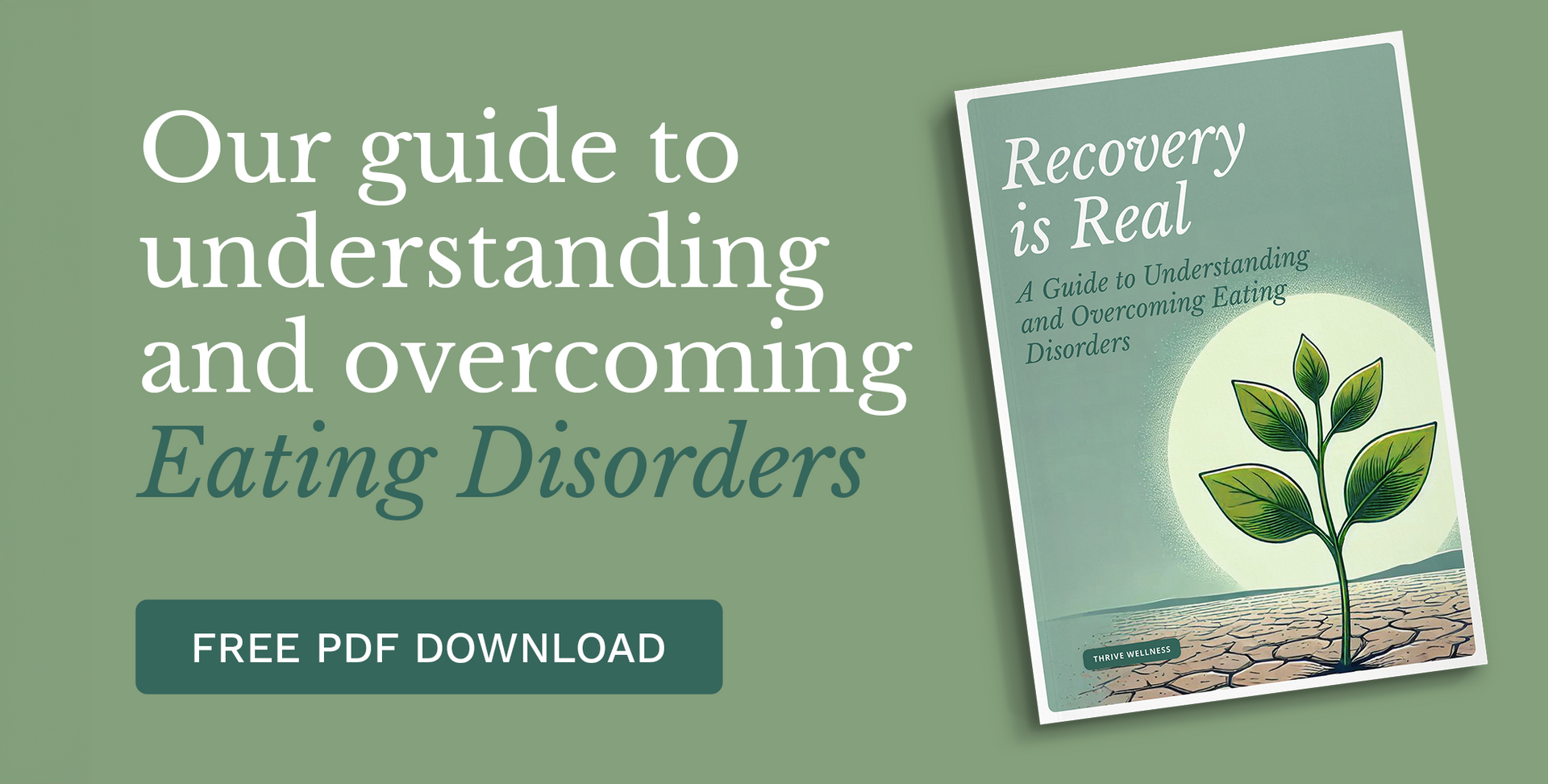The Differences Between Avoidant Restrictive Food Intake Disorder (ARFID) and Pediatric Feeding Disorder (PFD) and the Role of Occupational Therapy in Treatment

By Thrive Reno Occupational Therapist Dr. Meadow Deason, OTD, OTR/L
Both avoidant restrictive food intake disorder (ARFID) and pediatric feeding disorder (PFD) involve a disturbance in the way individuals eat and typically affect youths. Both conditions can be dangerous, as individuals experiencing either disorder will often eat a limited amount and variety of food. Those with ARFID avoid eating foods due to their sensory elements, general lack of interest in food, or fear of adverse consequences of eating, while those with PFD limit their intake of food because of medical conditions or deficits in motor skills.
Occupational therapists help individuals of all ages overcome obstacles that interfere with their ability to carry out daily activities, including eating. Integrating occupational therapy into the treatment of ARFID and PFD can empower individuals with skills and strategies to make eating more accessible and enjoyable.
WHAT IS AVOIDANT RESTRICTIVE FOOD INTAKE DISORDER (ARFID)?
ARFID is a kind of eating disorder that most often develops in children and adolescents. Individuals with ARFID may avoid foods due to lack of interest in eating. They may also have an aversion to certain sensory characteristics of food, meaning they may be highly sensitive to the color, taste, temperature, or texture of particular foods. Additionally, individuals with ARFID may have fears about experiencing pain or discomfort while eating, such as choking. Unlike many other eating disorders, ARFID does not typically involve a disturbance in one’s body image.
Signs and symptoms of ARFID include:
- Extremely limiting the intake of food of certain types or textures, and often becoming more so over time
- Fear of choking or vomiting
- Low weight or dramatic weight loss
- Failure to achieve age-appropriate weight or height benchmarks
- Nutrient deficiency or malnutrition
- Reliance on a feeding tube or nutritional supplements
- Cold intolerance, dressing in layers to stay warm despite comfortable environmental temperatures
- Digestive issues including constipation, abdominal pain, and constant stomach upset
- Lethargy
- Interference in carrying out daily activities
- No body image disturbance, meaning there is no distortion of perception related to body weight, size, or shape
- No fear of weight gain
Risk factors for ARFID include:
- Autism spectrum disorder (ASD)
- Attention-deficit/hyperactivity disorder (ADHD)
- Intellectual disabilities
- Anxiety disorders
- Picky eating at a young age
- History of choking or food trauma
OCCUPATIONAL THERAPY FOR ARFID
When a person is struggling with ARFID, an occupational therapist may use the following interventions to help them learn to embrace eating without fear.
- Sensory modulation strategies: These strategies guide individuals in processing their sensory perception, which can help clients with ARFID to perceive food in a more open and accepting way.
- Non-nutritive food exposures: Exposures to food that don’t involve eating the food can promote a more neutral sensory response to the food, increasing tolerance to the sensory elements of food.
- Graded exposure to non-preferred foods: Slowly and progressively exposing children to non-preferred foods can help integrate a wider range of foods into their diets.
- Parent and caregiver training for mealtime success: Educating parents and caregivers on ARFID and strategies for helping their children overcome food aversion can provide children with the support they need.
WHAT IS PEDIATRIC FEEDING DISORDER (PFD)?
A relatively new clinical diagnosis, PFD occurs when a child’s ability to intake nutrients orally is impaired in a way that doesn’t align with the abilities characteristic of others of the same age. PFD is associated with medical, nutritional, feeding skills, and/or psychosocial dysfunction.
Medical conditions that impact various body systems are risk factors for PFD. These systems include:
- The gastrointestinal system
- The cardiovascular system
- The respiratory system
- The neuromuscular system
Signs and symptoms of PFD include:
- Age-inappropriate disturbance in the oral intake of nutrients lasting at least two weeks, associated with medical, nutritional, or feeding skills dysfunction
- Medical dysfunction includes:
- Cardiorespiratory dysfunction during feeding
- Aspiration
- Recurrent aspiration pneumonitis, which can occur after the inhalation of regurgitated gastric contents
- Nutritional dysfunction includes:
- Malnutrition
- Specific nutrient deficiency
- Decreased dietary diversity resulting in the restricted intake of one or more nutrients
- Reliance on enteral feeds, also known as tube feeding, or oral supplements to sustain nutrition and/ or hydration
- Feeding skill dysfunction includes:
- Need for texture modification of liquid or food
- Use of modified feeding position or equipment
- Use of modified feeding strategies
- Psychosocial dysfunction includes:
- Active or passive avoidance behaviors by individual when feeding or being fed
- Inappropriate caregiver management of child’s nutrition needs
- Disruption of social functioning within a feeding context
- Disruption of caregiver-child relationship associated with feeding
- Medical dysfunction includes:
- Absence of the cognitive processes consistent with eating disorders and pattern of oral intake isn’t due to a lack of food or congruent with cultural norms
For more on the signs, symptoms, and diagnostic criteria of PFD, you may consider referring to the Journal of Pediatric Gastroenterology and Nutrition’s (JPGN) article on the topic.
OCCUPATIONAL THERAPY FOR PFD
Because PFD involves medical, nutritional, feeding skills, and psychosocial components, the condition requires an integrated approach and multidisciplinary treatment team. Occupational therapists play an important role in treating PFD and may implement the following tactics as part of clients’ treatment:
- Feeding skill development: Occupational therapists work with children to help develop their feeding skills by improving their upper extremity and oral motor skills, finding effective mealtime positioning, and carrying out basic swallow training.
- Parent and caregiver training for mealtime success : As with ARFID, the education of parents and caregivers can be vital in overcoming any psychosocial factors.
- Coordination of care with other providers: Occupational therapists typically work with their clients’ other health care providers to ensure the entire treatment team is efficiently working towards promoting clients’ independence in self-feeding, eating, and swallowing.
DIAGNOSING ARFID AND PFD
Since PFD is a new diagnosis, the medical community is still understanding how the signs and symptoms of ARFID and PFD differ, so misdiagnosis can occur at times. Both ARFID and PFD have nutritional and psychosocial components, but ARFID doesn’t necessarily have a medical cause or involve a deficit in feeding skills.
An individual could be diagnosed with ARFID due to limited food intake, however, multiple medical and feeding skills factors can contribute to limited food intake and may even point to PFD as a diagnosis.
If you believe your loved one might be experiencing ARFID or PFD, it is encouraged to explore the symptoms and circumstances with their pediatrician who can then refer specialized care as appropriate.
THRIVE HERE
Thrive’s multidisciplinary team specializes in eating disorder treatment that involves occupational therapy in addition to medical, psychiatric, therapeutic, and nutritional support. Our experts collaborate on each clients’ care to ensure treatment is effective, integrative, and targeted to the individual. Additionally, Thrive currently offers outpatient occupational therapy for both ARFID and PFD. Reach out to learn more about our eating disorder treatment programs.
About the Author
Thrive Reno Occupational Therapist Dr. Meadow Deason, OTD, OTR/L
Dr. Meadow Deason earned her doctorate of occupational therapy at Huntington University and is a licensed doctor of occupational therapy (OTD). As an occupational therapist, she has extensive clinical experience in neurological and physical rehabilitation, fall prevention education, community-based services, home health, and mental health. Dr. Deason is also trained in oral motor function assessment, feeding therapy, therapeutic pain education, home modification, aging in place, brain injury rehabilitation, sensory integration, integration of primitive reflexes, neuromuscular rehabilitation, upper extremity rehabilitation, behavioral management, ergonomics, and mindfulness. She partners with individuals and their loved ones to overcome emotional, physical, and social barriers to holistic health through meaningful activities designed to develop, recover, modify, or maintain skills for thriving in everyday life.
Prior to becoming an occupational therapist, Dr. Deason gained years of experience in early childhood intervention, social services, treatment, foster care, special education, and business.









